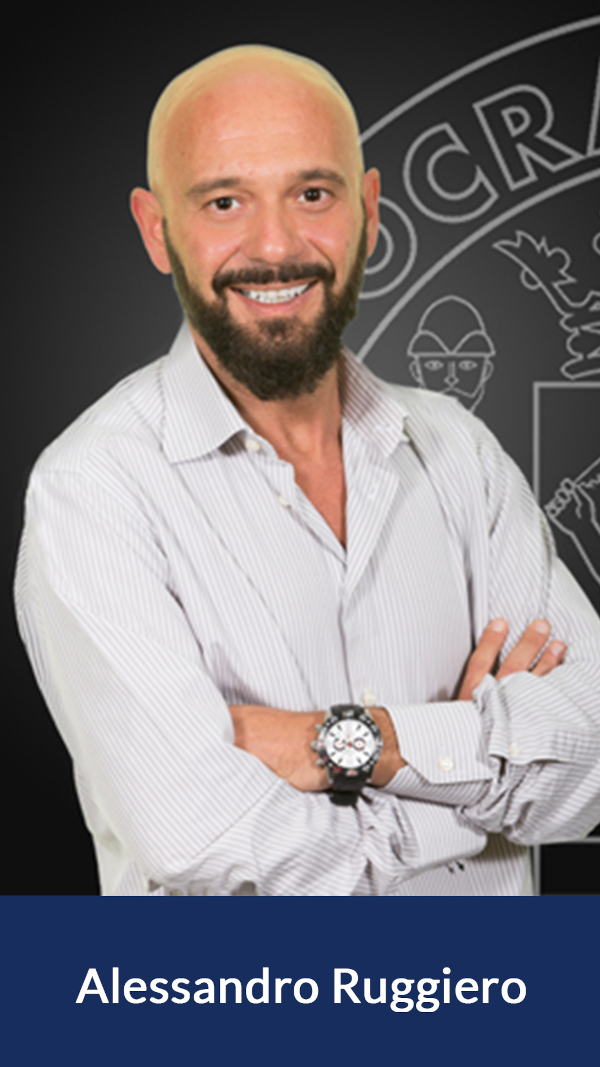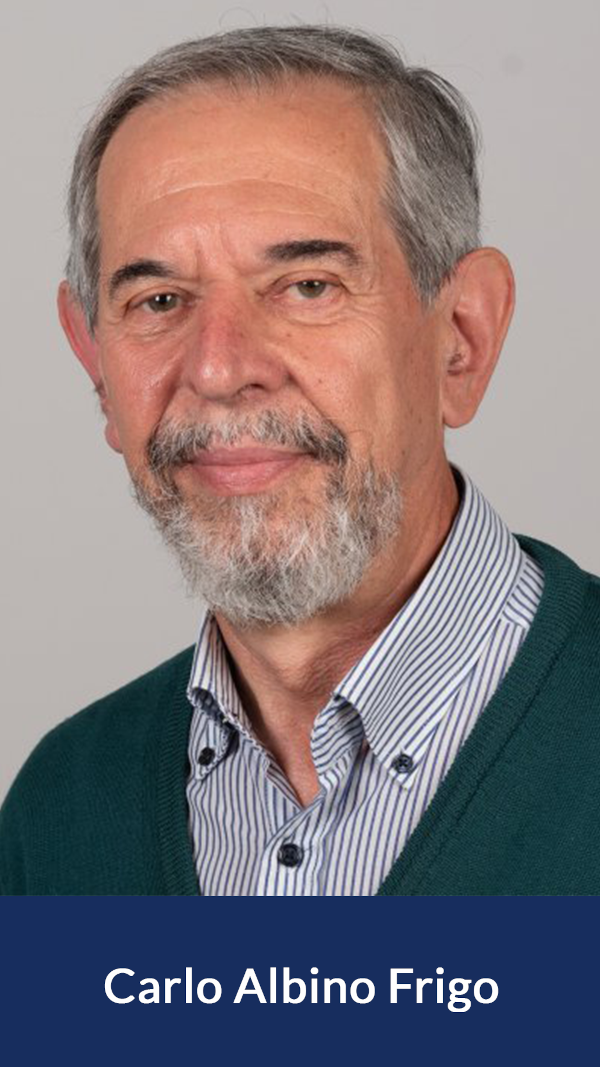Keynote Speakers


Prof. Alessandro Ruggiero
University of Salerno (Italy)Biotribology in arthroplasty: Recent insights into total hip replacements synovial lubrication modelling
Abstract
Nowadays hip arthroplasty is recognized as one of the most successful orthopedic surgical procedures, even if it involves challenges to overcome, such that lately, younger and more active patients are in need of total arthroplasty. Wear is still one of the main issues affecting joint prostheses endurance, and often causes loosening accompanied by implant failures. Actual in vitro wear tests executed by mechanical simulators have a long duration, are very expensive, and do not take into account all the possible daily activities of the patients. Thus, the challenge to obtain a complete in-silico tribological and dynamical model of (bio) tribo-systems could give the possibility to overcome the actual testing procedures and could contribute as a tool for a more accurate tribological design of human prostheses. The actual research trends are devoted to achieve accurate numerical algorithms to be used both in preclinical testing and in the optimizations of the prostheses design. This could be possible by novel in silico approaches in artificial joints’ wear assessment over time, accounting for contact mechanics, numerical stress–strain analysis, musculoskeletal multibody, and synovial lubrication modelling: boundary/mixed, hydrodynamic, and elastohydrodynamic.
The talk is devoted to give an overview of the last research results on total hip replacements, underlining some open problems in contact mechanics, numerical stress-strain analysis, musculoskeletal multibody modelling, synovial lubrication modelling, with the aim to establish future research cooperation with the Colleagues attending Biomodlore 2023.
Bio
Alessandro Ruggiero, PhD from 1999 to 2005 was Assistant Professor with the Department of Mechanical Engineering, University of Salerno, and Associate Professor with the Department of Industrial Engineering since 2005.
In 2017 he received the National qualification to Full Professor in Applied Mechanics.
He authored more than 220 scientific papers on prestigious indexed international journals and national and international proceedings. He is included in the “Stanford lists of the best influencer Researcher of the years 2019, 2020 and 2021 on the world”. He serves as Editor, member of the Editorial Board and reviewer for many WoS/SCOPUS indexed International Scientific Journals, and as evaluator of national and international research projects. He cooperates with many international Universities and prestigious Research Centers. He is member of the PhD Committee in Industrial Engineering at University of Salerno, and Production and Industrial Design at Polytechnic University of Madrid -SP. He serves as vice-President of the International Advisory Board of the Czech University of Life Science in Prague -CZ- and he is member in the International Scientific Advisory Board of the Interdisciplinary Council of Opole University of Technology Doctoral School -PL. He is member of the International Federation for the Promotion of Mechanism and Machine Science IFToMM -Technical Committee for Tribology- and National Coordinator of Italian AIMETA Tribology Group -GAIT. He is founder and CEO of the Academic Spinoff and innovative Startup ACOUSTICLAB srl. His current research interests are focused on (bio) tribology, biomechanics, in-silico wear calculation of artificial human synovial joints, but they include also dynamics of mechanical systems, acoustic noise and vibrations, mechanical measurement and diagnostic on mechanical systems.


Prof. Carlo Albino Frigo
Politecnico di Milano (Italy)Biomechanics: Musculoskeletal models to investigate the biomechanics of the locomotor system
Abstract
Musculoskeletal models open up a new perspective in biomechanical studies, making it possible to reproduce the behaviour of complex systems such as the foot, the various joints of the upper and lower limbs, and the whole body as a whole. The most interesting feature is the possibility to make different body segments interact dynamically and to allow us to simulate the effects of the change of the structural properties and of the forces applied to the system. In this way, it is possible to investigate in detail the role of the different components (ligaments, muscles, contact surfaces) and gather useful information that can be used in rehabilitation, surgery, joint replacement, and facing many clinical/biomechanical problems. In the keynote, the process of building a dynamic musculoskeletal model will be analysed and examples of their clinical application will be presented.
Bio
Carlo Albino Frigo graduated in 1976 at the Politecnico di Milano, and started his scientific activity at Politecnico in collaboration with the Scientific Institute Don Carlo Gnocchi Foundation, where he contributed to the development of a new research center, the Centro di Bioingegneria, for the studies of neuro-muscular diseases and functional assessment of locomotion. He is part of the department of Electronics, Information and Bioengineering and School of Biomedical Engineering. He has been teaching several subjects in the area of bioengineering of neurosensory systems, movement biomechanics, motor and postural rehabilitation, both at Politecnico and at Universià degli Studi (Science of Rehabilitation degree). His teaching subjects are at present Functional Evaluation and Motor Rehabilitation, and Bioengineering of the Motor System. Carlo Albino Frigo was among the persons who founded the Italian Society of Clinical Movement Analysis (SIAMOC), where he served as the first Secretary and then as President from 2007 to 2009; he has been a member of the Scientific Committee of ESMAC (European Society for Movement Analysis in Adults and Children) from 2001 to 2005; he has been among the founders of the Italian Member Society of ISPO (International Society for Prosthetics and Orthotics). Carlo Albino Frigo is a referee and member of the editorial board of several international scientific journals, has participated in several European Union research projects, and has organized conferences and educational courses at national and international levels. His main scientific interests are: movement analysis, biomechanics of movement, motor control, musculoskeletal modeling, and applications to neuro-muscular diseases, motor rehabilitation, prostheses, and orthoses. In September 2012 has been invited to deliver the Baumann Lecture at the 21st Annual Meeting of ESMAC.


Anna Stec, ClinSci, MSc, MIPEM
NHS EnglandClinical Engineering: Medical Device Risk Management and Governance in the context of implementing new services and improvement programs within the English public health and care system, where a comprehensive approach is required to ensure the safe and effective integration of novel medical and digital technologies.
Abstract: Healthcare digitization projects have gained significant prominence in recent years, leading in a new era of healthcare delivery. A review of the case studies delivering transformative synergy between novel medical technology and healthcare digitization projects, showcasing their pivotal roles in revolutionizing patient diagnosis, treatment, and management, and reshaping the landscape of English healthcare (the NHS) will be presented. It will examine the impact of cutting-edge medical technologies in tandem with digitization initiatives on patient care outcomes, operational efficiency, and healthcare system cost-effectiveness. Furthermore, it will explore the role of biomedical/clinical engineers in driving the healthcare digitization, and in promoting and enabling data driven decision making in healthcare. It also examines the implications of digitization for healthcare professionals, emphasizing the need for ongoing training and skill development in a rapidly evolving digital healthcare landscape.
Bio
Anna Stec is a healthcare scientist with specialist expertise in biomedical and clinical engineering. After graduating with BSc biomedical engineering from Bialystok University of Technology, she moved to England to complete her MSc in Biomedical Engineering (Biomaterials) at Imperial College London. Later she completed a highly competitive national training scheme, the National Health Service Scientist Training Programme and MSc in Medical Physics and Clinical engineering from King’s College London. After qualifying as a registered Healthcare Scientist with the Health Care Professions Council, she moved into a medical device risk management and governance role at the United Lincolnshire Hospitals NHS Trust and a subsequent role of a Healthcare Science Fellow at NHS England and Improvement in London. She led nationally on developing the Point of Care Testing services in Primary Care for which she was shortlisted for the Excellence in Healthcare award in 2020. She published a Point of care testing in community pharmacies guide. In the Covid-19 pandemic outbreak she supported the London Emergency Preparedness, Resilience and Response (EPRR) team as a Covid-19 Incident Coordination Centre Manager. She is passionate about her profession and has been involved in developing new Healthcare Science qualifications – T-levels in England for the last three years. She has been a guest speaker at the scientific and engineering conferences, including at the Sino-European Medical Management Forum 2020 in Shanghai. Currently she supports benefits realisation of multiple programmes across the Medical Directorate and Transformation Directorate at NHS England (the national regulatory body), with a special focus on Scan4Safety programme.